Discover the Charm of Zaria
If you’re looking for a unique travel experience, Zaria, Nigeria, is a city that will captivate you with its rich heritage. The city is home to some impressive historic sites, like the ancient Zaria City Walls and the Emir’s Palace, which give you a glimpse into the region’s rich past.
The atmosphere in Zaria is a blend of traditional and modern, with bustling markets where you can snag local crafts and a taste of the local cuisine. You’ll discover a city that balances traditional heritage with modern Nigerian life, providing an authentic experience away from typical tourist routes.
Zaria offers a unique blend of historical significance and cultural richness that makes it a worthwhile destination for travelers exploring Nigeria. This comprehensive guide aims to showcase why Zaria deserves a spot on your Nigerian travel itinerary and how to make the most of your time there.
You’ll learn practical information about visiting Zaria, including the best time to visit, transportation options, and accommodation recommendations to make your trip smooth and enjoyable.
Discovering Zaria: A Historical Nigerian Gem
As you step into Zaria, you’re immediately immersed in a rich tapestry of Nigerian history and vibrant daily life. This city, with a population of 1.1 million, is a fascinating mix of ancient history and modern-day significance.
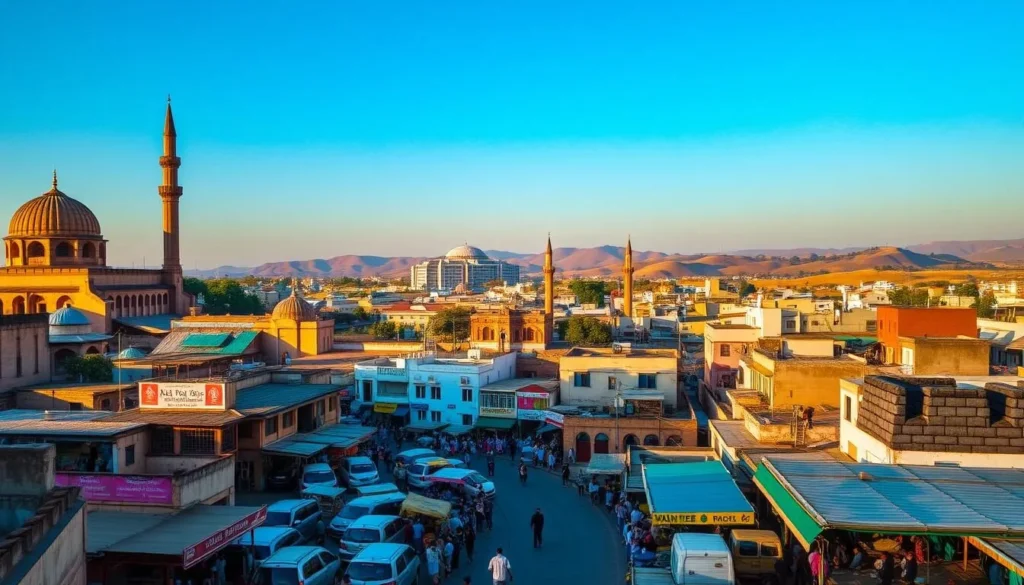
What Makes Zaria Special
Zaria stands out among Nigerian cities due to its unique blend of academic significance and deep historical roots. As home to the prestigious Ahmadu Bello University, Zaria has been an important cultural and educational center for centuries. The city’s heritage as part of the ancient Hausa kingdoms has shaped its architecture, traditions, and daily life, offering insights into authentic Nigerian culture. Its strategic location in northern Nigeria makes it an excellent base for exploring other parts of the country.
Best Time to Visit Zaria
The best time to visit Zaria is from November to March, when the weather is most pleasant with lower humidity and temperatures, making exploration more comfortable. Visiting during the dry season offers clearer skies and easier access to all attractions. Understanding the seasonal variations will help you plan your trip to coincide with local festivals and events that showcase Zaria’s vibrant cultural heritage. By avoiding the rainy season (April to October), you’ll ensure a smoother trip to this significant place in Nigeria.
Exploring Zaria’s Ancient Heritage
As you step into Zaria, you’ll uncover the rich tapestry of its ancient heritage. The city’s historical significance is palpable in its ancient structures, which have stood the test of time. Zaria’s rich history is a testament to its importance in the region.
Zaria City Walls: 14th Century Fortifications
The Zaria City Walls, dating back to the 14th century, are a significant part of Zaria’s history. Walking along these ancient fortifications gives you a sense of the city’s defensive structures and its historical importance. You’ll step back in time as you explore these impressive walls, which once served as crucial defensive fortifications for the ancient city.
These walls represent one of the most significant historical sites in northern Nigeria, offering a tangible connection to the region’s pre-colonial past and strategic importance. The engineering achievements of early Hausa builders are evident in the construction of these walls.
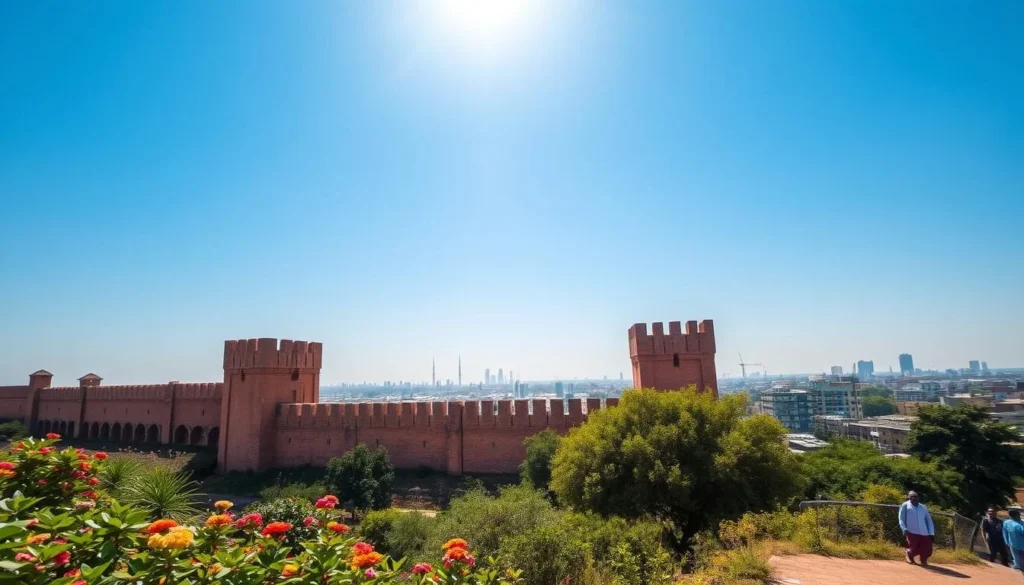
Kofar Doka: The Iconic Traditional Gate
At Kofar Doka, you’ll discover one of Zaria’s most iconic traditional gates, which served as a controlled entry point to the walled city and remains an important cultural landmark today. The gate’s distinctive architecture showcases traditional building techniques and design elements that have influenced structures throughout the region.
You’ll learn about the historical significance of these locations in the context of trade routes, military history, and cultural exchanges that shaped northern Nigeria. Photography enthusiasts will find numerous opportunities to capture the unique textures, shadows, and historical elements of these well-preserved structures.
Visiting these ancient heritage sites provides a unique perspective on Zaria’s history and its continued influence on the modern city’s development. The city walls and Kofar Doka are must-visit places when exploring Zaria’s ancient heritage.
Cultural Landmarks in Zaria
Zaria is home to numerous cultural landmarks that showcase its rich history and heritage. As you explore the city, you’ll encounter sites that have played a significant role in shaping the region’s identity.
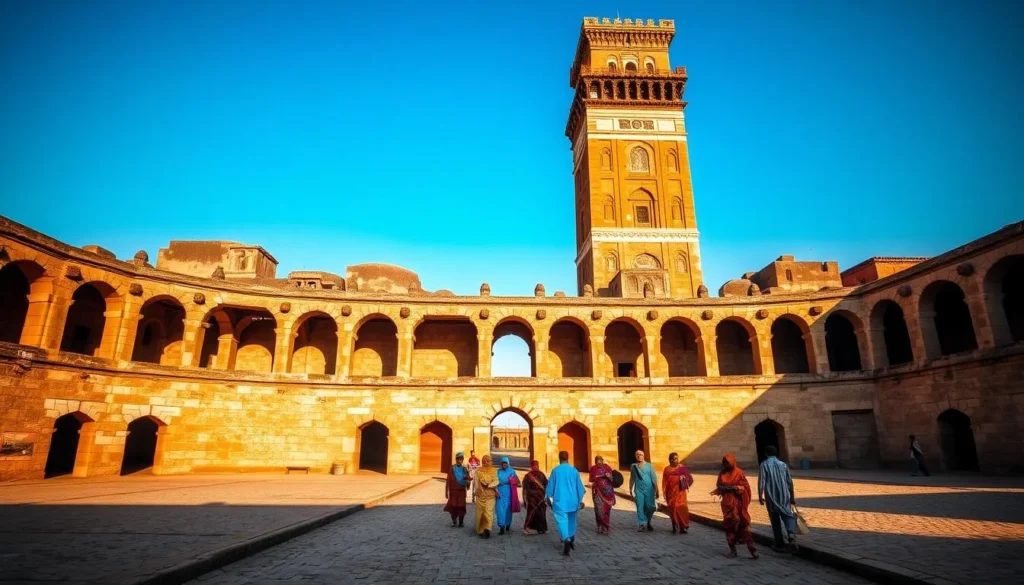
The Emir’s Palace: Royal Heritage
The Emir’s Palace is a grand representation of Zaria’s royal heritage. While you can’t enter the palace, the exterior architecture is impressive, and the grounds often reflect the rich culture of the Hausa people. It’s an ideal spot for photography, capturing the essence of the region’s royal traditions.
You’ll be captivated by the grandeur of the Emir’s Palace, a living monument to Zaria’s royal heritage and continuing cultural traditions. The palace serves as both a historical site and a functioning administrative center, highlighting the importance of traditional governance systems in modern Nigerian society.
Zaria Museum: Artifacts and History
The Zaria Museum houses a collection of artifacts that tell the story of the region’s history and cultural heritage. It’s a must-visit attraction for a deeper understanding of Zaria’s heritage and the various influences that have shaped the city.
At the Zaria Museum, you’ll discover a treasure trove of artifacts that chronicle the region’s rich history, from ancient tools to colonial-era documents. The museum’s collections offer a comprehensive overview of how different cultural influences have blended to create Zaria’s unique cultural identity.
Both the Emir’s Palace and the Zaria Museum provide essential context for understanding the social structures, religious practices, and artistic traditions that continue to influence daily life in Zaria. You’ll have the opportunity to interact with knowledgeable local guides who can share insights and stories not found in guidebooks, enriching your experience of these cultural attractions.
Educational and Religious Sites
As you explore Zaria, you’ll discover that education and spirituality are deeply intertwined in this historic city. The city’s landscape is dotted with institutions that have played a significant role in shaping the intellectual and spiritual fabric of the region.
Ahmadu Bello University: Campus and Architecture
Ahmadu Bello University is one of Nigeria’s premier educational institutions, and its campus is a testament to the country’s rich architectural heritage. The university’s distinctive architecture blends traditional northern Nigerian design elements with modern educational facilities, creating a unique campus atmosphere worth exploring. As you wander through the university grounds, you’ll witness the vibrant student life that has made Zaria an important educational center and cultural melting pot for students from across West Africa.
The university’s sprawling campus is not just a place of learning but also a hub of cultural activity. You might even catch a cultural event or festival that showcases the diversity and richness of Nigerian culture.
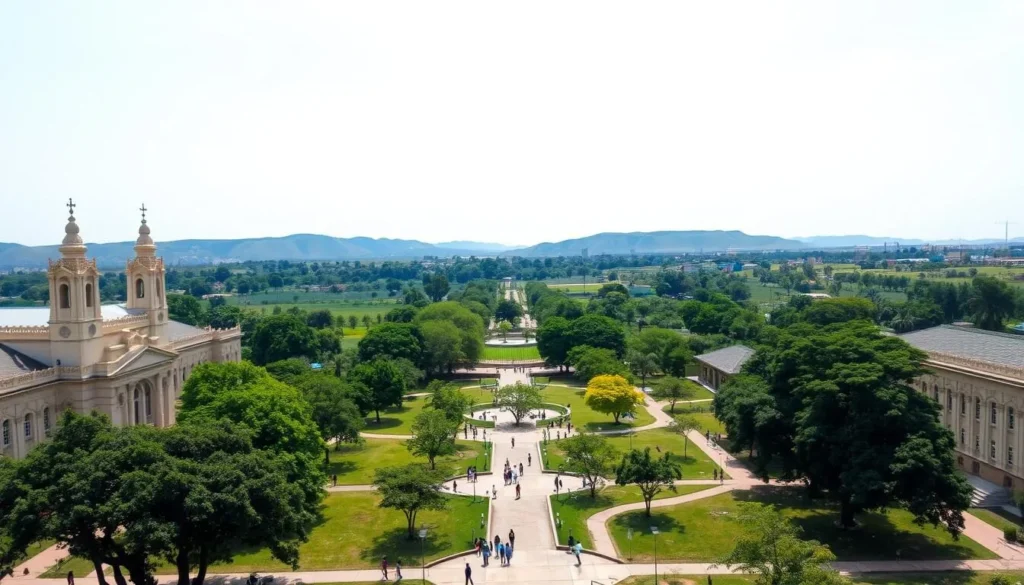
Zaria Central Mosque: Spiritual Significance
The Zaria Central Mosque stands as a magnificent example of Islamic architecture in Nigeria, with its impressive domes, minarets, and intricate geometric patterns that reflect centuries of artistic tradition. This important spiritual center serves as the heart of religious life in the city, where you can observe (respectfully) the rhythms of daily prayers and community gatherings.
Even if you’re not Muslim, the mosque’s architectural beauty and peaceful atmosphere make it a worthwhile visit to understand an essential part of Zaria’s cultural identity. The proximity of the mosque to other educational institutions highlights how educational and religious life have developed in parallel throughout Zaria’s history.
Markets and Shopping Experiences in Zaria
The markets in Zaria are a must-visit, providing an authentic taste of local life in this vibrant city. As you explore these bustling marketplaces, you’ll be immersed in the sights, sounds, and aromas of Nigerian culture.
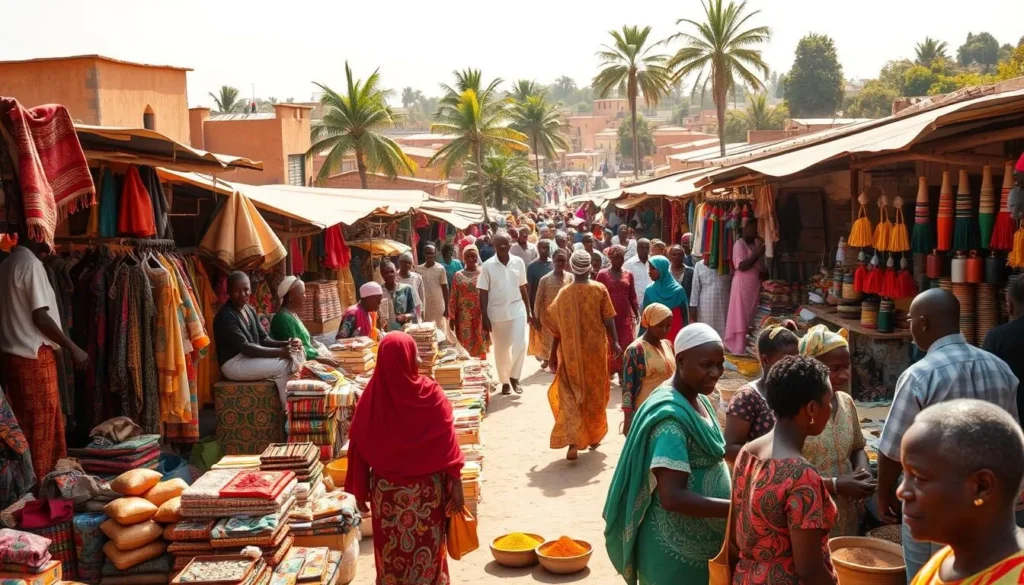
Kano Road Market: A Hub for Textiles and Crafts
Kano Road Market is a treasure trove of traditional Hausa crafts, where you can find intricately designed leather goods, handwoven textiles, and metalwork that showcase local artisanship. As you navigate the market stalls, you’ll discover how these commercial spaces serve as important social hubs where community news is exchanged and relationships are maintained.
- You’ll experience the vibrant energy of Kano Road Market, where colorful textiles and handcrafted goods create an authentic Nigerian shopping experience.
- The market offers opportunities to purchase traditional crafts, including intricately designed leather goods and handwoven textiles.
Samaru Market: A Glimpse into Daily Life
Samaru Market provides a genuine insight into daily life for Zaria residents, particularly those connected to the university community. You’ll have the chance to sample local delicacies and street foods that reflect the diverse culinary traditions of northern Nigeria.
- At Samaru Market, you’ll experience a less tourist-oriented marketplace that offers a real taste of daily life in Zaria.
- The market is perfect for trying local foods and snacks while mingling with locals in a relaxed atmosphere.
Both markets offer a window into the economic life of the city, where traditional trading practices continue alongside modern commerce. By shopping at these markets, you’ll be supporting local artisans and farmers while taking home authentic souvenirs that represent the region’s cultural heritage.
As you visit these markets, you’ll gain a deeper understanding of the seasonal variations in market offerings, from agricultural products to festival-specific items that reflect the rhythm of life in this location. Whether you’re a tourist or simply looking to experience the best of Zaria, these markets are a must-visit destination.
Natural Attractions Around Zaria
Beyond the city’s historical landmarks, Zaria’s natural attractions offer a refreshing change of pace. The areas around Zaria are home to a diverse range of natural sites that showcase the region’s culture and geography.
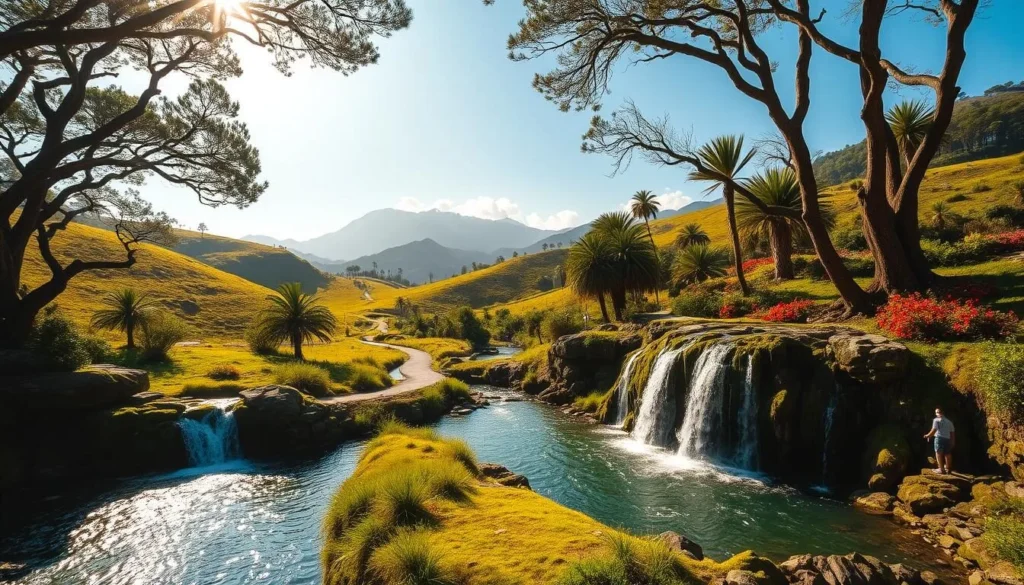
Kubanni River
The Kubanni River is a peaceful spot to relax or take a walk along the bank. You’ll find welcome respite from urban energy along the river’s banks, where peaceful walking paths and shaded areas offer natural retreats within easy reach of the city center.
- The river has played a crucial role in Zaria’s development, providing water for agriculture and daily use throughout the city’s long history.
- Seasonal changes transform the river landscape, from lush greenery during the rainy season to more subdued but equally beautiful scenes during the dry months.
Rural Villages
Exploring the rural villages surrounding Zaria will give you authentic insights into traditional farming communities where agricultural practices have been passed down through generations.
- You’ll witness how these communities maintain strong connections to the land through seasonal planting and harvesting cycles, traditional farming techniques, and community cooperation.
- These villages offer opportunities to experience genuine hospitality as locals often welcome respectful visitors interested in learning about their way of life.
The natural areas around Zaria provide important context for understanding how the region’s geography and natural resources have shaped its cultural development and economic activities. Photography enthusiasts will find countless opportunities to capture the interplay between natural landscapes and human activities in these less-visited areas around Zaria, making for a great adventure and a unique experience in this location.
Day Trips from Zaria, Nigeria: Best Things to Do
As you settle into Zaria, you’ll discover that its central location offers a gateway to exciting day trips. The city’s proximity to other fascinating destinations makes it the perfect hub for exploring northern Nigeria’s rich history, cultural landmarks, and natural beauty.
Kaduna City: Historical Sites and Museums
Just an hour’s drive south, Kaduna City offers a wealth of historical experiences through its museums and colonial architecture. The National Museum in Kaduna houses impressive collections of traditional art and historical artifacts, providing a broader context for the cultural heritage you’ll observe in Zaria.
Kafanchan Area: Scenic Landscapes
For adventure seekers, the Kafanchan area is a must-visit, with its rolling hills and dramatic rock formations creating stunning landscapes. This scenic destination offers a unique contrast to Zaria’s urban experience and is easily accessible via local transportation options.
| Destination | Key Attractions | Travel Time from Zaria |
|---|---|---|
| Kaduna City | National Museum, Colonial Architecture | 1 hour |
| Kafanchan Area | Scenic Landscapes, Rolling Hills | 2 hours |
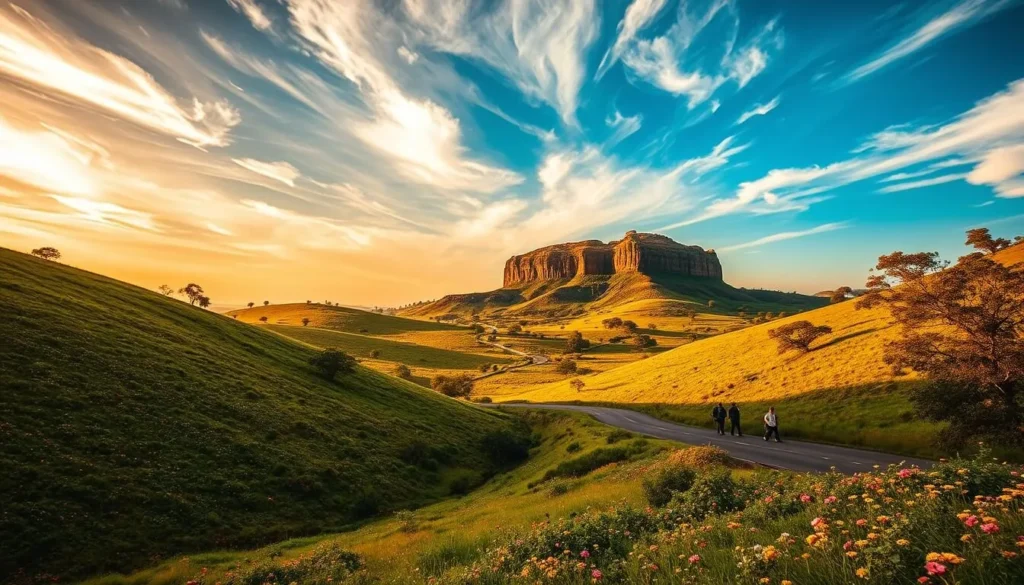
These day trips allow you to compare urban experiences across different Nigerian cities, noting the unique character and atmosphere that distinguishes each location. With local transportation options available, you can easily explore these nearby destinations and expand your experience of northern Nigerian cuisine.
Practical Tips for Visiting Zaria
Zaria, with its rich history and cultural significance, is a destination that benefits from careful planning regarding transportation and accommodation. As you prepare to visit this Nigerian city, understanding the practical aspects will enhance your experience.
Getting Around
Transportation in Zaria includes motorcycle taxis (okada), three-wheeled keke napep, and shared taxis, offering various balances of cost and convenience. For travelers coming to Zaria, options include trains from major cities, long-distance buses, or private car hire, with trains being the most comfortable despite occasional delays. When navigating the city, be prepared for rough roads and plan accordingly.
Places to Stay
Accommodation in Zaria ranges from basic guesthouses to mid-range hotels, with the best options near the university area or city center for easy access to major attractions. Booking in advance is advisable, especially during university events or local festivals when tourist infrastructure can be limited. Your home away from home in Zaria will be more enjoyable with some planning.
| Aspect | Details |
|---|---|
| Best Time to Visit | November to March (dry season) |
| Local Transport | Okada, Keke Napep, Shared Taxis |
| Accommodation | Guesthouses, Mid-range Hotels |
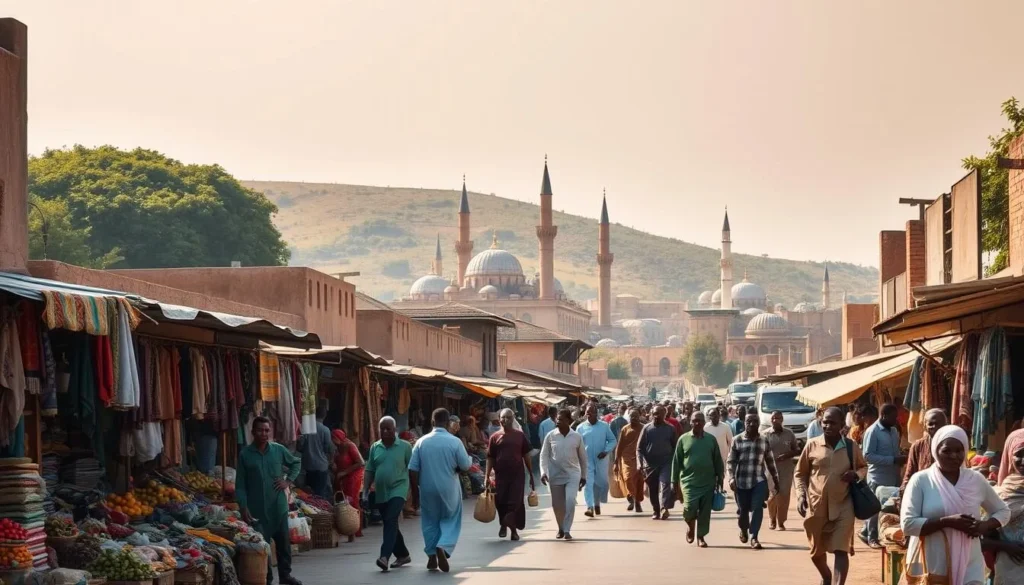
Conclusion
Steeped in history and culture, Zaria is a city that will captivate your senses and broaden your understanding of Nigeria. As you explore this ancient city, you’ll discover a perfect blend of historical landmarks, cultural immersion, and authentic experiences.
From the ancient city walls to the vibrant university campus, Zaria presents a multifaceted portrait of Nigeria, encompassing both traditional heritage and contemporary life. Your visit will leave you with unforgettable memories and inspire further travels to other Nigerian cultural landmarks like the Sukur Cultural Landscape, Olumo Rock, or the Obudu Mountain Resort in Cross River State.
As you plan your broader Nigerian itinerary, consider how Zaria might complement visits to national parks, the Ngwo Pine forests, or the Ogbunike Caves, creating a comprehensive journey through one of Africa’s most diverse and fascinating countries. Whether you’re a history enthusiast or cultural explorer, Zaria rewards visitors with memorable encounters and perspectives rarely found along more traveled routes.
The above is subject to change.
Check back often to TRAVEL.COM for the latest travel tips and deals.
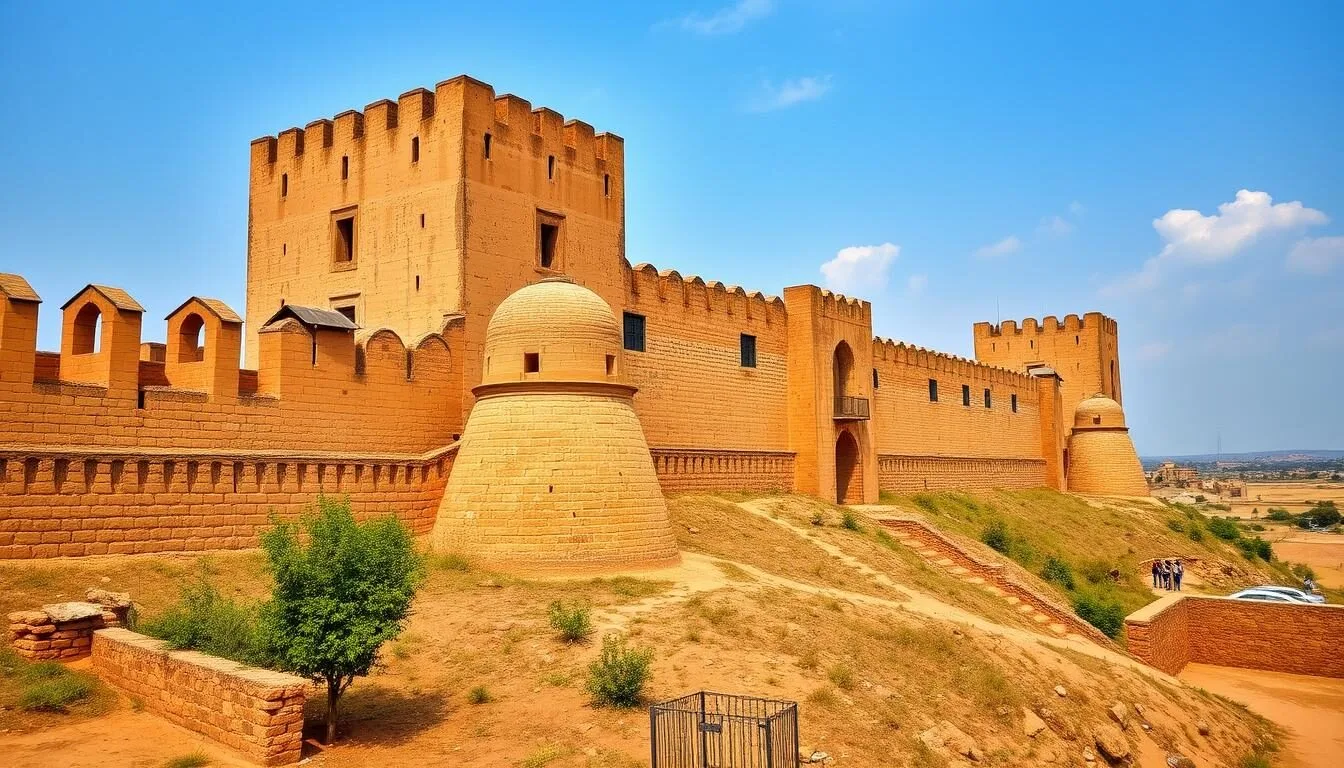
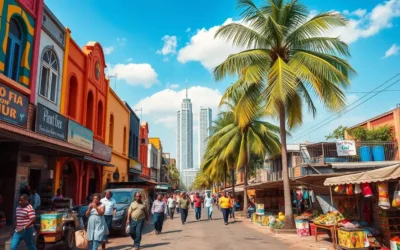
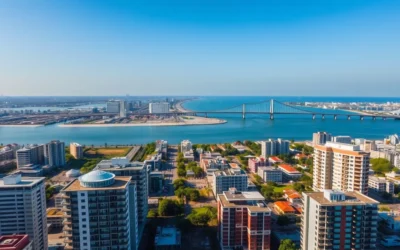
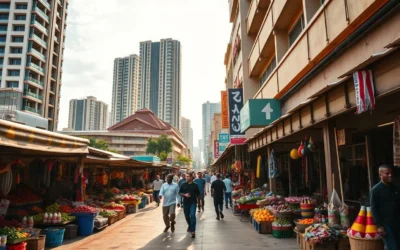
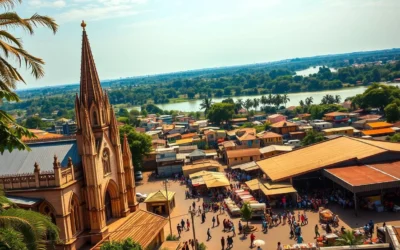
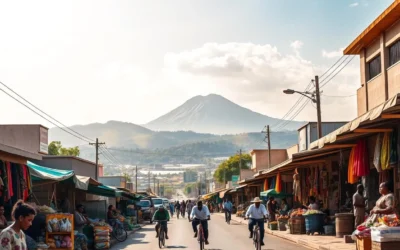
0 Comments